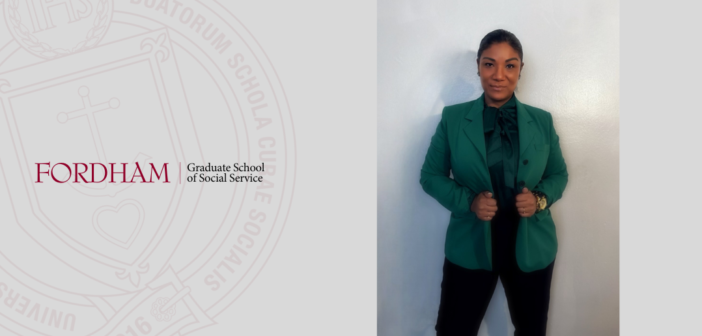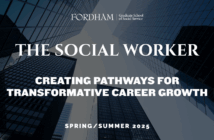For years, Erica Vargas, LMSW, GSS ’23, was a teller at Chase Bank. Her branch was a short walk away from Fordham’s Lincoln Center campus.
“I would actually go to Lincoln Center [Performing Arts Center] on my lunch break,” she said. “And I would see Fordham and say, ‘That’s such a beautiful campus.’”
Vargas’s mother immigrated to New York from El Salvador without a higher education degree or help. Once in the United States, she met her husband, an immigrant from the Dominican Republic, and they had four daughters together. America gave them and their children a better life. While Vargas had been successful in her career at that point, she felt destined for more. With no higher education under her belt yet, she wondered what going back to school would do for her.
Little did she know that 20 years later, she’d graduate with her Master of Social Work degree (M.S.W.) from the school she passed on her lunch breaks. Moreover, she’s now using that degree to help asylum seekers obtain resources as an assistant director at Goddard Riverside Community Center.
“When I see people become self-sufficient—when they can move out, transition into their own apartment, secure employment, and provide for their families,” Vargas said, “that’s what’s most rewarding about my job.”
Paying It Forward
After realizing that a career in banking wasn’t her calling, Vargas enrolled in coursework to receive her bachelor’s in psychology.
“I thought I wanted to be Dr. Wu, from [Law and Order] SVU,” she said.
However, Vargas always had an inclination toward social work. She had two children as a high school student, and a school social worker played a vital role in Vargas’s early motherhood experience.
“She would come visit my home. She would support my parents, who did not have higher education experience. I graduated high school with two children because of the social worker’s support,” Vargas said. “She motivated me.”
After completing her psychology degree, Vargas worked as a case manager in the social services sector. In this role, she worked primarily with domestic violence survivors and in medical care coordination. As the COVID-19 pandemic began, Vargas was providing care coordination services on Manhattan’s Upper West Side for predominantly Black and Brown communities accessing Medicaid—communities that research shows were disproportionately impacted by the virus.
At work, Vargas was troubled by the lack of Latino bilingual representation from the licensed social workers she collaborated with. She saw the barriers it created for clients and how their outcomes and well-being were negatively impacted.
“There wasn’t anyone who could speak their language, so it was a barrier for them,” Vargas said. “It was a barrier for seniors especially to get the services they needed.”
Realizing how effective she was in her role and how much impact she could have on those in the Latino community, Vargas knew it was time to further her education and pursue this passion.
“I said, ‘You know what, I’m going to get my master’s and eventually my license so I can help this community,” Vargas said, “because they really did count on me during that time.”
A Pursuit of Passion
When applying to Master of Social Work programs, Vargas chose just one school—that same one she’d pass by on her lunch break from Chase. Things had come full circle. She was living her dream.
As a case worker, Vargas had many mentors who completed Fordham’s M.S.W. program, and their words of encouragement gave her the confidence she needed that Fordham’s Manhattan campus was the place for her.
“They spoke marvelously about Fordham, and said the type of support and mentorship that you receive in Fordham’s program, you’re not going to get anywhere else,” Vargas said. “I just knew that I wanted to be a Fordham alumni. I wanted to have that.”
During her time in the Specialist Phase of the M.S.W., Vargas was accepted into the PIPELINE for Youth Health Fellowship Program, a grant-funded Behavioral Health Workforce, Education, and Training (BHWET) program that focuses on “teaching students the skills needed to work with youth across the entire continuum of care and practice effectively on interprofessional teams in integrated care settings.”
Along with specialized behavioral health coursework, Vargas completed a field placement internship at a school within the New York City Department of Education. She provided individual counseling and group counseling to students who were asylum-seekers new to the country. The experience was eye-opening, she said.
“I saw how the trauma of crossing the border affects the schoolwork,” she said. “They’re thrown into a classroom and expected to learn it for a test three months…down the line, and their mental health is not addressed.”
Vargas said the PIPELINE program allowed her to learn more about what students need from the school system besides strictly academic support. She said their behavioral and mental health need addressing first, which will contribute to academic success.
“There’s a reason why children are acting out,” she said. “There is an underlying cause. Everything I learned in the PIPELINE program helped me realize there’s more work to be done.”
Continued Representation in the Community
In 2023, Vargas graduated from Fordham’s M.S.W. program with the skills and tools she needed to make her desired impact. However, before she returned to the working world with this knowledge, she allowed for a moment of reflection. Fordham’s Commencement ceremony at the Rose Hill campus allowed Vargas, a first-generation student, to celebrate her years of hard work with my years of hard work with her mother, sisters, sons, and many other loved ones who supported her along the way.
“For her [Vargas’s mother] to see me walk across that stage and enjoy that with me was one of the most memorable events I will never forget, and she will never forget,” Vargas said. “It was overwhelming, and it was a moment that I would like more people to experience. Hopefully, with my story, they will know no matter what life throws your way, if you stay focused, it is possible.”
Now, Vargas works as an assistant director at the Goddard Riverside Community Center, an organization with a long history of partnership with Fordham GSS. She is hiring to supervise a team of 12 at one of Goddard’s asylum seeker sanctuaries in New York City, providing services to families in the area. Vargas said her experience at the DOE influenced her decision to seek this work as a career.
“I knew I wanted to work with the asylum seekers because of what I saw in the DOE, speaking with the children and their parents,” she said. “I knew there was a bigger need in the community.”
Vargas explained that the site’s purpose expands beyond housing but takes a holistic view when providing services. Goddard hopes to allow asylum seekers the capacity to socialize and engage in activities led by Vargas’s team that infuse social emotional concepts into the content.
“What I love about Goddard Riverside is we are trying to bring…a home-like environment to the sanctuary site itself,” Vargas said. “Socializing is so important, especially for the children.”
Vargas’s team also supplies resources to asylum seekers to assist them in navigating the asylum process, which can be intimidating and confusing. Seeking help can sometimes come with a cultural stigma for these people, Vargas said, and the best way to mitigate this issue is to provide a client-centered, welcoming environment—skills she attributed to learning in Fordham’s program.
“I’m bringing in everything I’ve learned through all my mentors in school, my career, and the PIPELINE program,” she said. “Whatever I learned at Fordham, I try to pass it on.”



